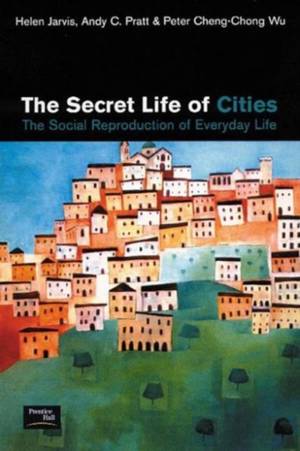
- Afhalen na 1 uur in een winkel met voorraad
- Gratis thuislevering in België vanaf € 30
- Ruim aanbod met 7 miljoen producten
- Afhalen na 1 uur in een winkel met voorraad
- Gratis thuislevering in België vanaf € 30
- Ruim aanbod met 7 miljoen producten
Zoeken
The Secret Life of Cities
Social Reproduction of Everyday Life
Helen Jarvis, Andy C Pratt, Peter Cheng-Chong Wu
Paperback | Engels
€ 119,45
+ 238 punten
Uitvoering
Omschrijving
Contemporary urbanisation has two faces: global flows of people, money and information, and that of localised social and economic disparities. Recent research has focused on the headlines of global cities as control centres of the world economy, and social and economic shock waves that have raged through cities and regions, but less attention has been paid to the secret life of cities, and the changing nature of everyday life in the wake of such changes.This book challenges current research and policy agendas recommending spatial concentration and relocation as a solution to the problems of environmental sustainability and social dislocation. Instead, this book highlights the key linkages between social and environmental problems, it argues that neither are likely to be resolved with a simple spatial fix. The book draws attention to local contexts of contemporary urbanisation emphasising consideration of policy making from the perspective of the household as a key unit of analysis in identifying links between labour and housing markets, transport and leisure.This book draws upon detailed household interviews about the daily experience of life in a global city. It illustrates the dilemmas and solutions that people routinely find in order to go on in their lives. It shows that these local fixes that are managed at the level of the household work in spite of, and sometimes against, existing policies aimed at sustainability. It concludes that policy making needs to be radically overhauled in order to address the integrated nature of people's everyday lives.
Specificaties
Betrokkenen
- Auteur(s):
- Uitgeverij:
Inhoud
- Aantal bladzijden:
- 216
- Taal:
- Engels
Eigenschappen
- Productcode (EAN):
- 9780130873187
- Verschijningsdatum:
- 6/03/2001
- Uitvoering:
- Paperback
- Formaat:
- Trade paperback (VS)
- Afmetingen:
- 156 mm x 234 mm
- Gewicht:
- 308 g

Alleen bij Standaard Boekhandel
+ 238 punten op je klantenkaart van Standaard Boekhandel
Beoordelingen
We publiceren alleen reviews die voldoen aan de voorwaarden voor reviews. Bekijk onze voorwaarden voor reviews.











